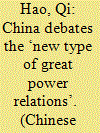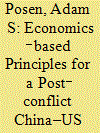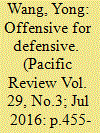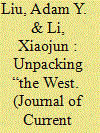|
|
|
Sort Order |
|
|
|
Items / Page
|
|
|
|
|
|
|
| Srl | Item |
| 1 |
ID:
143679


|
|
|
|
|
| Summary/Abstract |
The proposal to forge a ‘new type of great power relations’ is one of the most important diplomatic innovations this Chinese administration has made. Although popular in official discourse, Chinese scholars diverge greatly on how to define the new concept. Debates focus on who the great powers are and what the new relations feature. All are rooted in the vagueness of this concept in official discourse. As the official interpretation of the concept is changing, the debate is also narrowing to that of the goals of the new relations. However, the revision of this concept makes it less practical due to its disconnectedness with the reality of China–US relations. The revised expression also diminishes the uniqueness of the new relations proposal, which implies that it may no longer be a feasible guide to China–US relations or an effective framework for academic studies on the power transition between existing and established powers.
|
|
|
|
|
|
|
|
|
|
|
|
|
|
|
|
| 2 |
ID:
161576


|
|
|
|
|
| Summary/Abstract |
Neither the Chinese nor US economic systems will fundamentally change as a result of overt trade conflict. The challenge for policy‐relevant economics is to design a regime for China–US commerce that accepts the co‐existence but also addresses underlying disputes. Many important China–US disputes, notably those over intellectual property protection and state subsidies, cannot be resolved by the World Trade Organization, thus new institutions must be built. Economics‐based regime principles should entail recognition that: the China–US bilateral trade imbalance is unique mainly because of macroeconomic and financial factors, not trade; agreements should restrict commercial and government behaviors, not target economic outcomes; Chinese companies must compete and be allowed to succeed in any sector, including high‐technology; China is not entitled to US‐owned technology, thus intellectual property rights must be enforced; and the US Government should support an increased role for China in global economic governance.
|
|
|
|
|
|
|
|
|
|
|
|
|
|
|
|
| 3 |
ID:
165146


|
|
|
|
|
| Summary/Abstract |
Small states throughout the Asia-Pacific are confronted by a growing dilemma over how to balance their traditional security ties with the US and rapidly growing trade with China. This gives Washington and Beijing potential leverage over small states to use within their competition with one another. This article explores the implications of this for New Zealand – a small South Pacific state that prides itself on maintaining an independent foreign policy. Situated within the small state literature, it utilises a material-based strategic triangle to illustrate the fundamental facets of New Zealand's position. Relatedly, the article examines how Wellington has managed its burgeoning relations with China and the US over the past decade and critically considers New Zealand's independent foreign policy. It finds that New Zealand has adopted a mixed set of strategies to manage its position between the US and China, closely aligning itself with Washington while remaining nonaligned on some key security issues in the Asia-Pacific region. New Zealand has certainly not opted for neutrality. The article concludes that New Zealand and other small states must remain vigilant, may want to consider alternative strategies of alignment, and outlines a number of areas where additional research could prove fruitful.
|
|
|
|
|
|
|
|
|
|
|
|
|
|
|
|
| 4 |
ID:
182597


|
|
|
|
|
| Summary/Abstract |
China has responded to criticisms of its handling of the COVID outbreak by an assertive foreign policy style referred to as ‘wolf-warrior diplomacy’. This study argues that this does not represent a radical shift in Chinese foreign policy but exacerbates a pre-existing trend. We say that this assertiveness builds upon the twin pillars of ‘core interests and the unambiguous exposition of the ‘striving for achievement’ policy adopted by China since Xi Jinping’s elevation as the President in 2012. We outline China’s response to its competition with the United States, based on heightened nationalism and practiced through centralised decision making.
|
|
|
|
|
|
|
|
|
|
|
|
|
|
|
|
| 5 |
ID:
144910


|
|
|
|
|
| Summary/Abstract |
China's Belt and Road initiative came from the combined pressure of slowing down of Chinese economy, US pivot to Asia and deterioration of the relations with neighboring countries after weathering the storm of the Global Financial Crisis of 2008. It also symbolizes a more proactive approach of Chinese new leader Xi Jinping in meeting the expectation on China's international obligation and leadership. Aimed to link Asia, Europe, Africa and Oceania, the initiative provides tremendous opportunities of international economic cooperation. The paper argues that as China's contribution to international public goods, it is in the line of economic liberalism; as China's grand strategy, it is more of defensive than offensive by nature. Despite risks and uncertainties exist, the enforcement will boost China's influence and position in regional and international institutions. US should consider making more strategic space to the rising China, and a better coordinated China–US relations will make Asia Pacific a safer and more promising region.
|
|
|
|
|
|
|
|
|
|
|
|
|
|
|
|
| 6 |
ID:
189907


|
|
|
|
|
| Summary/Abstract |
Recent public opinion polls conducted in Europe and the United States show increasingly negative views of China. Does the Chinese public hold similar views of “the West”? Conducting a two-wave survey in China, we found great divergence and asymmetries in Chinese public perceptions. First, Chinese views of European countries and the US diverge sharply, despite these countries being typically grouped together as “the West” in mainstream English and Chinese discourses; the Chinese viewed the US much more negatively than Europe. Second, whereas the Chinese reciprocated American antipathy, there was an asymmetry in public perceptions between China and Europe, with the Chinese expressing much greater favourability towards European countries than the other way around, though the degree of favourability still varied by country. Analyses of respondent attributes also yielded insights that both confirm and challenge some of the conventional wisdom regarding age, education, and party membership in Chinese public opinion.
|
|
|
|
|
|
|
|
|
|
|
|
|
|
|
|
|
|
|
|
|